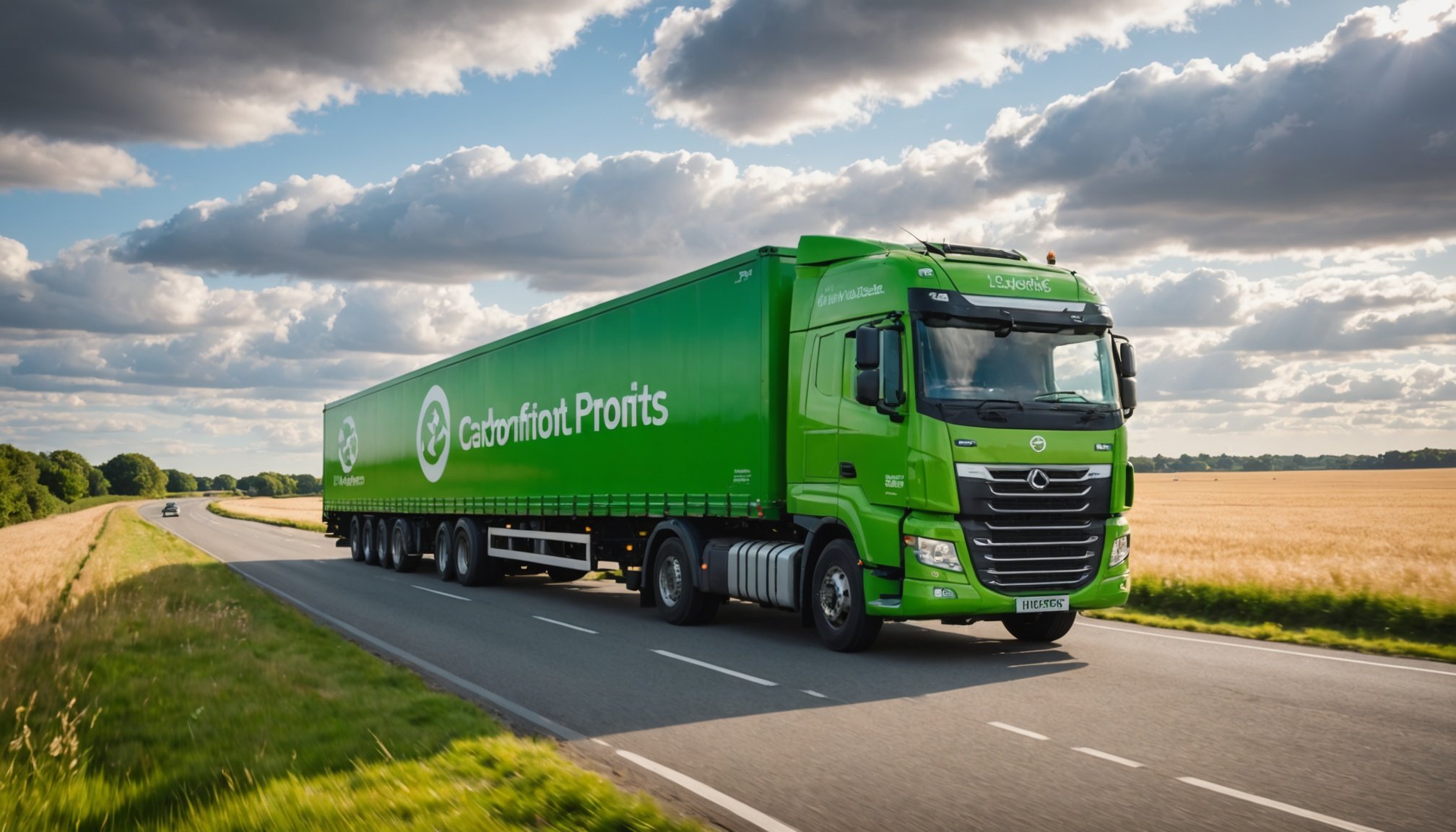Importance of Reducing Carbon Footprints in UK Logistics
The logistics sector in the UK plays a critical role in carbon emissions, significantly impacting climate change. With transportation and warehousing contributing substantially to the carbon footprint, the sector faces mounting pressure to adopt sustainable practices.
Efforts to reduce emissions have become intrinsic to national sustainability goals. The government and various organisations are pushing for greener methods. The logistics industry is central to this initiative, tasked with transforming operations to meet these targets. Improving energy efficiency, enhancing fuel technologies, and optimising delivery routes are pivotal moves toward meaningful reductions.
Also to discover : Revolutionizing uk dining: a comprehensive guide to adopting sustainable seafood practices for restaurant chains
Consumer behaviour increasingly influences the push for sustainability. With rising environmental awareness, there is a growing demand for carbon footprint reduction in logistics. Businesses must meet these expectations by integrating more sustainable practices into their operations. This involves investing in eco-friendly vehicles or adopting renewable energy sources.
Emerging trends also see companies leveraging digital technology to minimise emissions. Implementing data analytics for better route management and using AI for efficient warehousing are examples. These technological advancements not only help reduce the carbon footprint but also present opportunities for cost savings and enhanced operational efficiency.
Topic to read : Innovative Approaches to Sustainable Water Management in UK Farming: Strategies for a Greener Future
Actionable Strategies for Reducing Carbon Emissions
Embracing sustainable transportation practices presents significant opportunities for reducing carbon emissions. By focusing on eco-friendly logistics, organisations can implement actionable strategies to curb their carbon footprint effectively.
Optimizing Transportation Routes
Optimizing routes with advanced software eases traffic congestion and minimizes emissions. The route planning software employs GPS and real-time traffic data to chart the most efficient paths. Such technology ensures vehicles spend less time idling, subsequently reducing fuel consumption. Several case studies demonstrate substantial emissions reductions as a result of effective route optimization.
Transitioning to Electric or Alternative Fuel Vehicles
Electric vehicles offer a compelling alternative to traditional fuel vehicles in the logistics sector. They produce zero emissions during operation, substantially lowering overall carbon output. The government often supports this transition with incentives, encouraging the adoption of green vehicle technologies. When compared to conventional options, electric and alternative fuel vehicles consistently outperform in reducing environmental impact.
Implementing Efficient Warehouse Practices
Warehouse operations also contribute to emissions. Employing energy-efficient technologies, such as LED lighting and smart HVAC systems, significantly lowers energy consumption. Strategies such as airtight building designs and waste reduction techniques also play crucial roles. An effectively run warehouse not only saves energy but also enhances overall operational efficiency. Implementing these carbon reduction strategies holistically improves sustainability across the logistics landscape.
Innovative Technologies in UK Logistics
In the constantly evolving landscape of logistics, smart logistics solutions are paving the way for efficiency and sustainability. With the Internet of Things (IoT) and automation, logistics efficiency has reached unprecedented levels. But how exactly do these innovations make a difference? IoT devices allow real-time tracking of shipments, ensuring precision and timely updates. This helps companies reduce costs and vastly improve delivery times, with automation streamlining warehouse operations by handling repetitive tasks, thus cutting down labour costs and errors.
Data analytics plays a pivotal role in emission tracking and management. It’s a game-changer, offering insight into carbon footprint reduction strategies. By collecting and analysing vast amounts of data, logistics firms can identify where emissions occur most and implement changes for better sustainability.
Looking forward, future trends point towards more innovations in sustainability. Technologies such as blockchain for transparent supply chain processes and electric or hydrogen-fueled vehicles are emerging as key players. These technologies promise to further enhance the role of logistics technology in creating a more eco-friendly industry. Ultimately, embracing these technologies not only aligns with ethical responsibilities but also offers competitive advantages in a market increasingly motivated by environmental consciousness.
Case Studies: Successful Implementations in the UK
Exploring successful case studies offers a nuanced understanding of best practices in the UK logistics sector. Analysing these examples helps businesses identify effective strategies.
Company A: Transitioning to a Green Fleet
Company A implemented a series of strategic initiatives, showcasing significant improvement in UK logistics. These strategies included adopting alternative fuel sources and integrating fleet management software to optimise routes. Such measures led to a noticeable reduction in carbon emissions, aligning well with environmental sustainability goals. Key learnings from this transition highlighted the importance of investing in technology and training to maximise efficiency and performance.
Company B: Warehouse Innovations
Company B took a groundbreaking step in re-imagining warehouse operations. The implementation of automation and energy-efficient lighting systems resulted in measurable carbon reduction. Data-driven inventory management emerged as a key element, enhancing accuracy and reducing waste. These actions underscore the need for continual assessment and adaptation to achieve long-term sustainability goals. Consequently, Company B’s innovations set a benchmark for others in the career path towards a carbon-neutral future.
This improvement in logistics operations signifies a progressive shift, revealing that the integration of novel practices can lead to measurable environmental benefits and increased operational efficiency.
Government Policies and Incentives Supporting Sustainability
Government policies have become increasingly vital in driving sustainability within the logistics sector. In the UK, a diverse array of government policies focuses on minimizing logistics emissions and promoting eco-friendly practices. The Clean Growth Strategy is a prime example, targeting a reduction in carbon footprints across various industries. Another significant policy, the Road to Zero, aims to eliminate vehicular emissions entirely by 2030, encouraging the adoption of zero-emission transport solutions.
The UK also provides sustainability incentives to businesses willing to embrace environmentally friendly operations. Firms can access grants through initiatives like the Green Business Fund and benefit from tax relief schemes when investing in sustainable technology. These incentives not only reduce operational costs but also enhance a company’s corporate image.
Engagement and compliance with these policy frameworks is crucial for businesses striving for sustainability. Participation not only aligns them with national and international environmental goals but also opens up opportunities for financial savings and brand enhancement. Ignoring such policies could lead to penalties and missed opportunities in an ever-competitive market. Adapting to government strategies ensures businesses are part of a sustainable future, fostering growth and innovation within the industry.
Practical Tips for Logistics Professionals
Adopting sustainable business practices is crucial for modern logistics. Training and educating employees within your organisation is foundational to achieving carbon reduction. By engaging your workforce, you enable them to contribute actively to sustainability goals. Various resources, such as online courses and workshops, can empower your employees with knowledge about eco-friendly practices.
Training and Educating Employees
Why involve your workforce in sustainability efforts? Workforce involvement cultivates a sense of responsibility and shared values. Consider companies like Patagonia, which have excelled by weaving sustainability into their organisational culture. They offer seminars and certifications that not only educate but help employees feel invested in the company’s mission.
Collaborating with Suppliers and Customers
Building a sustainable supply chain involves collaboration. Open dialogue with suppliers and customers about mutual sustainability goals is key. Take Unilever, for example, which successfully partnered with suppliers to lower emissions. Strategies such as regular meetings ensure alignment on objectives, fortifying these partnerships. Discussing green innovations or eco-packaging can create ‘win-win’ scenarios.
Monitoring and Reporting Emission Reductions
Tracking your carbon footprint is critical. Emission reduction tools provide data to help evaluate your progress. Transparency in reporting these results builds trust and accountability. Establishing well-defined KPIs further supports clear communication and demonstrates dedication to environmentally conscious practices.






